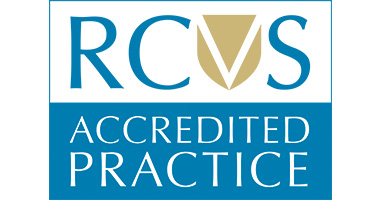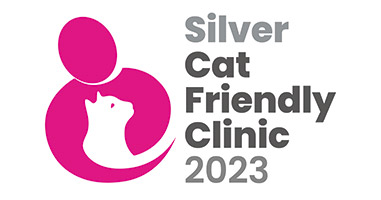Vaccination
Here in the UK, there are multiple diseases it is recommended to vaccinate against to prevent serious illness and death. Some of the diseases you may not have even heard of, because the regular use of vaccines in pet dogs, cats and rabbits has made their occurrence so much less common!
Dogs, cats and rabbits require regular 'booster' vaccinations throughout life after their initial vaccines to ensure their immunity to these diseases is maintained. These are usually timed alongside their annual health check where we can also pick up if there are any health concerns.
You can find out extra information about what we vaccinate for in different species and timings by clicking Dogs, Cats or Rabbits.
What range of vaccinations do we use?
We currently use the Nobivac range of vaccinations which are also compatible with the Canigen range of vaccines.
My pet is overdue their vaccinations, will they have to restart the course?
If your pet has been vaccinated with us, we will send you a reminder when their next vaccine is due. If a pet’s vaccinations have significantly lapsed (over one month overdue), the vet may determine that they need to restart their vaccination course and will discuss this with you based on your pet’s individual risk.
What if we don't want to vaccinate or my pet can’t be vaccinated?
If you choose not to vaccinate, titre testing is available to help determine your pet’s current immunity to disease for some (but not all) of the core diseases vaccinated for in cats and dogs. Your vet can discuss the pros and cons of these tests with you.
A blood test is taken and sent to an external lab to check the level of immunity. This test is often only done once a year, so if it shows poor immunity, there is no way of knowing when the immunity changed. This means there may have been a period where your pet wasn’t protected.
If your pet is unable to be vaccinated or you have chosen not to vaccinate, we recommend an annual health check to ensure any health concerns are not missed. Around 60% of pets will have a health condition identified at their vaccination health check.
Are there any side effects to vaccination?
We safely administer over 12,000 vaccines a year to pets which help prevent them from disease. The benefit due to vaccinations of reducing sickness and death is considered to far outweigh any potential adverse reactions.
Adverse reactions do occur in some pets, ranging from more common mild reactions like lumps/pain at the injection site, lethargy and a temperature, to serious but very rare (less than 1 animal in 10,000) reactions like hypersensitivities. Your vet will be happy to discuss anything about the subject with you at your visit to the practice.
Most reactions such as lethargy and temperature resolve without treatment within 12-24 hours. Some pets may have mild irritation at the injection site or develop a small lump under the skin. This usually goes away within a couple of weeks.
Allergic reactions to vaccinations are very rare but can happen. Symptoms can include vomiting, difficulty breathing, swelling and collapse. Allergic reactions usually occur within an hour or two of the injection. If your pet appears unwell after a vaccine, please contact us immediately.
Can you vaccinate ferrets?
Although no licensed vaccines currently exist for ferrets, depending on their risk of disease, we may recommend vaccination with products licensed for dogs.
Does my pet need a rabies vaccination?
The UK is currently rabies free and rabies vaccination is not required. If you are planning foreign travel with your dog, cat or ferret, rabies vaccination may be required. Please see our website section on foreign travel for further information.
Dogs
Core vaccinations for dogs are recommended to protect them from serious and potentially fatal diseases; even dogs that don't mix with other dogs are at risk.
What are the core vaccinations for dogs?
In the UK we vaccinate dogs for:
- Leptospirosis
o Leptospirosis can be fatal, and it causes a variety of signs including liver and kidney failure. It can be transmitted to other mammals, including humans.
- Distemper
o Distemper virus can affect almost every part of the body causing signs from runny eyes and coughing to diarrhoea and neurological abnormalities. Although it was almost wiped out by vaccination, cases of distemper have increased in the UK in recent years.
- Hepatitis (canine adenovirus)
o Infectious hepatitis causes fever, liver failure and clotting disorders. It is thankfully very rare now due to widespread vaccination.
- Parvovirus
o Parvovirus causes anorexia, vomiting and profuse haemorrhagic (bloody) diarrhoea. This rapidly results in dehydration and anaemia. There is no specific treatment for parvovirus and many dogs don't survive even with intensive care. The virus is extremely infectious and can survive in the environment for a long time.
- Other available non-core vaccinations include Kennel Cough which may be required by dog boarding establishments and Rabies which may be required for foreign travel.
When can my dog start their vaccinations?
Puppies can start their vaccination course from 6 weeks old and require at least 2 vaccinations, 4 weeks apart.
Puppies can usually then be walked and mix with other dogs 1 week AFTER completing their course.
Ideally, puppies will already have received a first vaccination with the breeder; depending on which vaccination they have received, they may require a top up of vaccinations or to restart a course. We can discuss this with you. We will need to see a copy of their vaccine card in order to determine what they need in advance of a puppy’s vaccine appointment.
How often will my dog need their vaccines?
In the UK, vaccination for Leptospirosis is required yearly to maintain immunity.
After initial puppy vaccinations and the first year's 'booster' vaccination, it is recommended to vaccinate for the other diseases (Distemper, Hepatitis and Parvovirus) every 3 years to maintain your dog's immunity.
Your vaccine card will state the date of revisit for their next vaccination.
Some breeds can have a poorer response to vaccination; we may recommend additional vaccines at 16 weeks old and 6 months old on a risk and benefit basis.
In the event of a local disease outbreak, we may also recommend additional vaccines to top up immunity.
Which leptospirosis vaccine do you use?
Due to prevalence of Leptospirosis in the south Wales area, we recommend and routinely use the Lepto 4 vaccination, which covers for the most serovars that could cause disease.
Does my dog need the kennel cough vaccine?
Kennel cough syndrome is caused by several different viruses and bacteria. It causes a ‘hacking’ cough. Although very infectious, it is not fatal, however it can make young or old dogs quite poorly.
The kennel cough vaccine is recommended for dogs that mix regularly with other dogs and is usually required by dog day care providers and kennels; we recommend them having the vaccine at least 3 weeks prior to attending a high risk location. It is possible for dogs to develop kennel cough, even if they have been vaccinated, but they tend to have less severe signs.
There is an additional cost for kennel cough vaccination; this vaccination is included on our health plan if required.
The vaccination is given up the nose and is a live vaccine. Some dogs also develop a transient cough within 1-2 weeks after vaccination. As it is a live vaccine, please let us know below if any member of your household has any immunosuppression issues as it may not be advisable to give the vaccine. We would recommend discussing with your GP about individual risk.
Can my dog have a vaccination if they are unwell or on medication?
It is only recommended to vaccinate heathy well animals to ensure that their immune system responds appropriately. The vet can discuss with you whether vaccination is appropriate for pets on treatment or who are unwell but may delay vaccination until recovery or medication has stopped for the benefit of your pet.
Cats
Core vaccinations for cats are recommended to protect them from serious and potentially fatal diseases; even indoor cats are at risk of many of these.
What are the core vaccinations for cats?
In the UK we vaccinate cats for:
- Feline Herpesvirus
- Feline Calicivirus
o Calicivirus and herpesvirus are the two most common causes of upper respiratory tract infection in cats, known as "cat flu". They cause a wide range of symptoms including eye infections and ulcers, inflammation of the mouth and gums, ulcers in the mouth, snotty nose and sneezing. Once infected, cats are never cured, but often experience relapses of infection through their lives especially in times of stress.
- Feline Panleucopenia Virus
o Causes severe diarrhoea and dehydration as well as a dangerously low white blood cell count (weakening the immune system). It is highly infectious and challenging to treat, but thankfully is very rare due to widespread vaccination.
- Feline Leukaemia Virus – OUTDOOR CATS ONLY
o Feline leukaemia virus infection causes severe depression of the immune system, anaemia, and can cause some types of cancer (such as lymphoma and leukaemia). Infected cats may not become ill straight away, but the majority die within a few years of diagnosis as there is no cure.
When can my cat start their vaccinations?
Kittens can start their vaccination course from 8 weeks old and require at least 2 vaccinations, 3-4 weeks apart, with the last vaccination over 12 weeks old.
Kittens (once also neutered) can then be let outside 1 week AFTER completing their course.
Ideally, kittens will already have received a first vaccination with the breeder; depending on which vaccination they have received, they may require a top up of vaccinations or to restart a course. We can discuss this with you. We will need to see a copy of their vaccine card in order to determine what they need in advance of a kitten’s vaccine appointment.
How often will my cat need their vaccines?
In the UK, vaccination for Feline Herpesvirus and Feline Calicivirus is required yearly to maintain immunity.
After initial kitten vaccinations and the first year's 'booster' vaccination, it is recommended to vaccinate for the other diseases (Panleucopenia, plus Feline Leukaemia virus if an outdoor cat) every 3 years to maintain your cat's immunity.
Your vaccine card will state the date of revisit for their next vaccination.
Can my cat have a vaccination if they are unwell or on medication?
It is only recommended to vaccinate heathy well animals to ensure that their immune system responds appropriately. The vet can discuss with you whether vaccination is appropriate for pets on treatment or who are unwell but they will often delay vaccination until recovery or medication has stopped.
Rabbits
Both indoor and outdoor rabbits require vaccinations to keep them safe from infectious disease. Young rabbits are particularly vulnerable to serious illnesses, so it’s important to get them vaccinated early.
What are the core vaccinations for rabbits?
In the UK we vaccinate rabbits for:
- Myxomatosis
o Causes swelling of the eyes and genitals, weakness, blindness and death. It is very prevalent in the wild rabbit population but the viruses spread easily, including to indoor rabbits.
- Viral Haemorrhagic Disease (VHD)
o VHD can cause serious disease such as bleeding, but in many rabbits causes "sudden death" without obvious illness first.
When can my rabbit start their vaccinations and how often will they need them?
Rabbits can be vaccinated from 5 weeks old but will need yearly booster vaccinations throughout their life to maintain immunity to both diseases.
Your vaccine card will state the date of revisit for their next vaccination.



